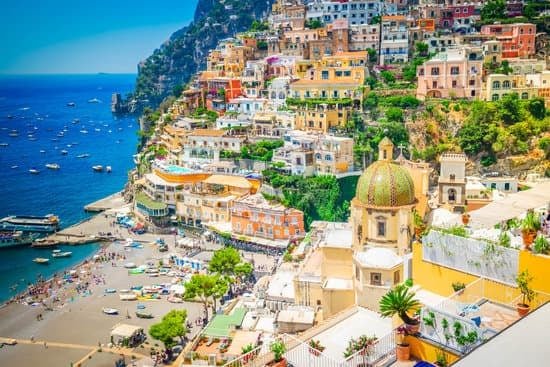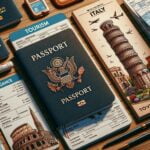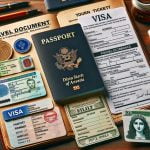Italy, with its rich history, vibrant culture, and breathtaking landscapes, is a dream destination for many travelers. However, before embarking on an Italian adventure, it is vital to ensure that you have all the necessary documents in order. From obtaining a valid passport to understanding visa requirements and organizing travel insurance, this article will delve into the essential documents needed for travel to Italy.
Among the first steps towards planning your journey is obtaining a valid passport. A passport is not only a form of identification but also serves as proof of nationality and allows you to enter foreign countries. Understanding the process of passport application, renewal, and validity is crucial to avoid any last-minute hassles or delays.
Visa requirements are another important aspect to consider when traveling to Italy. Depending on your nationality and the purpose of your visit, you may need to obtain an entry permit before entering the country. This section will help unravel the complexities of visa requirements, ensuring that you arrive in Italy with all the necessary permits.
It is also vital to protect yourself and your belongings during your Italian escapade by having appropriate travel insurance. This section will explore the significance of travel insurance in providing financial protection against unforeseen circumstances such as medical emergencies or lost luggage.
As you plan your trip to Italy, it’s crucial to understand the importance of various documents such as Schengen visas for seamless travel within the Schengen Area, proof of accommodation through hotel reservations or rental agreements, transportation documents like flight tickets or train passes, personal identification cards, and a travel itinerary for easy navigation throughout your stay. Additionally, equipping yourself with medical certificates and prescriptions can ensure a healthy journey.
Lastly, managing money matters effectively while traveling is essential. This section will discuss the significance of bank statements for financial stability abroad, traveler’s cheques as a secure payment option during your trip, and currency exchange tips for getting familiar with euros-the official currency in Italy.
With all these aspects covered, you will be able to embark on your Italian adventure well-prepared and ready to immerse yourself in the wonders that Italy has to offer. So, gather your documents, pack your bags, and get ready for a smooth journey through the land of pasta and gelato.
Obtaining a Valid Passport
When planning a trip to Italy, one of the first and most important steps is to ensure that you have a valid passport. A passport is not only your ticket to entering the country but also serves as a crucial form of identification during your travels.
To obtain a passport, you will need to visit your local passport office or post office and complete an application. The application will require you to provide personal information such as your full name, date of birth, and place of birth. You will also need to submit proof of citizenship, which can be in the form of a birth certificate or naturalization certificate.
Additionally, you will need to provide two recent passport-sized photos that meet the specific requirements outlined by the issuing authority. These photos must be clear, with a white background and your face taking up a certain percentage of the frame. It is always recommended to have these photos taken professionally to avoid any potential issues.
Once you have completed the application process and provided all necessary documents, you will need to pay the applicable fees. The fees may vary depending on factors such as your age and whether it is your first-time applying for a passport or renewing an existing one.
It’s important to note that processing times for passports can vary, so it is advisable to apply well in advance of your planned travel dates. Once issued, your passport will typically be valid for ten years for adults and five years for minors. Make sure to keep it in a safe place during your travels as losing or damaging it could cause significant disruptions to your trip.
By obtaining a valid passport early on in your trip planning process, you can ensure that you have met one of the essential requirements for traveling to Italy. With this crucial document in hand, you’ll be well on your way towards embarking on an exciting Italian adventure without any major hurdles or delays at customs.
Visa Requirements
When planning a trip to Italy, it is essential to understand the visa requirements and entry permits necessary for your visit. This section will delve into the various types of visas available and provide guidance on how to obtain them.
Types of Visas
Italy is part of the Schengen Area, which means that citizens from certain countries do not require a visa for short stays of up to 90 days. However, if you are from a country outside the Schengen Area, you will need to apply for a visa prior to your trip. There are different types of visas depending on the purpose of your visit, such as tourist visas, business visas, or student visas.
Applying for a Visa
To apply for an Italian visa, you will need to contact the nearest Italian embassy or consulate in your country. Each consulate may have specific requirements and procedures, so it is important to check their website or contact them directly for accurate and up-to-date information.
Generally, you will need to provide documents such as a completed application form, valid passport with at least six months’ validity remaining, proof of travel insurance coverage during your stay in Italy, proof of accommodation in Italy (hotel bookings or rental agreements), and proof of sufficient funds to cover your expenses.
Processing Time
It is advisable to apply for an Italian visa well in advance as processing times can vary. It is recommended to submit your application at least three months before your intended travel date to allow sufficient time for processing. The consular officer may also request additional documents or call you for an interview during the application process.
By understanding the necessary entry permits and following the correct procedures when applying for an Italian visa, you can ensure a smooth journey towards exploring all that Italy has to offer.
Travel Insurance
When planning a trip to Italy, it’s crucial to consider purchasing travel insurance to protect yourself and your belongings during your time abroad. Travel insurance provides coverage for a wide range of unforeseen situations that may arise while traveling, giving you peace of mind and financial protection.
There are several reasons why having travel insurance is important when visiting Italy. Firstly, medical emergencies can happen at any time, and the cost of healthcare in a foreign country can be expensive. With travel insurance, you can have access to emergency medical services without worrying about exorbitant bills. It covers expenses such as hospitalization, doctor visits, prescription medications, and even emergency medical evacuations if necessary.
Additionally, travel insurance also offers coverage for trip cancellation or interruption. Life is unpredictable, and sometimes unexpected circumstances force you to cancel or cut short your trip. This could be due to personal illness or injury, family emergencies, natural disasters, or even airline strikes. With travel insurance in place, you can recoup some or all of the non-refundable costs associated with your trip including flights, accommodations, tours, activities, and more.
Moreover, travel insurance provides protection for lost or stolen belongings. Theft or loss of luggage is unfortunate but not uncommon while traveling. Travel insurance typically includes coverage for lost baggage as well as personal items such as cameras, phones, jewelry, and laptops. It’s important to check the policy details regarding coverage limits and exclusions so you know exactly what is covered.
The Schengen Area
When planning a trip to Italy, it is important to understand the concept of the Schengen Area and its significance for travel. The Schengen Area is a zone comprised of 26 European countries that have abolished passport controls at their mutual borders. This means that travelers can easily move between these countries without the need for multiple entry visas or passport checks.
Italy is one of the countries within the Schengen Area, which means that visitors from certain non-European Union (EU) countries are required to obtain a Schengen visa before traveling. It is essential to check whether you need a visa based on your nationality and duration of stay in Italy.
To apply for a Schengen visa for travel to Italy, you will typically need the following documents:
1. Passport: Your passport should be valid for at least three months beyond your planned departure date from Italy. It should also have at least two blank pages for immigration stamps.
2. Visa application form: You will need to complete and sign an application form, which can often be found and submitted online through the official website of the Italian embassy or consulate in your home country.
3. Passport-sized photos: Most applications require two recent passport-sized photographs meeting specific size and background requirements.
4. Roundtrip flight itinerary: A confirmed reservation or a flight ticket showing your roundtrip travel plans from your home country to Italy is usually required.
5. Proof of accommodation: This can include hotel reservations, rental agreements, or an invitation letter if you are staying with friends or relatives.
6. Travel health insurance: A comprehensive travel health insurance policy with coverage of at least €30,000 ($36,000) is necessary. It should cover medical emergencies, hospitalization, repatriation, and other unforeseen expenses during your stay in Italy.
7. Financial proof: You may be asked to provide evidence of your financial ability to support yourself during your stay in Italy. This can include bank statements for the past three to six months, pay stubs, or a letter from your employer.
It is important to note that the requirements for a Schengen visa may vary slightly depending on the country where you apply, so it is advisable to contact the Italian embassy or consulate in your home country for specific information and instructions. Planning ahead and ensuring you have all the necessary documents will help ensure a smooth and enjoyable trip to Italy.
Proof of Accommodation
Hotel Reservations: Booking Your Stay in Italy
One of the essential documents needed for travel to Italy is proof of accommodation, which includes hotel reservations and rental agreements. When planning a trip to Italy, it is crucial to arrange your accommodations in advance. This not only ensures a smooth journey but also helps you meet the requirements for entry into the country.
To secure a hotel reservation, start by researching hotels in your preferred destination(s) and comparing prices and amenities. Many reputable websites allow you to book accommodations online, making the process convenient and efficient. Ensure that the hotel you choose offers flexible booking options, cancellation policies, and provides confirmation emails or vouchers.
It is important to remember that some visa applications may require evidence of a confirmed hotel reservation for the duration of your stay in Italy. Therefore, it is advisable to make all necessary bookings before applying for a visa. Additionally, having proof of accommodation can also be requested by immigration officials upon arrival in Italy as part of their routine border control procedure.
Rental Agreements: Exploring Alternative Accommodation Options
In addition to hotels, many tourists prefer alternative accommodation options such as vacation rentals or homestays during their visit to Italy. If you opt for this type of accommodation, it is crucial to have a copy of your rental agreement as proof.
When renting an apartment or house in Italy, make sure to carefully read the terms and conditions stated in the rental agreement. It should specify the duration of your stay, rental fees, any additional charges, rules and regulations, and other relevant information. Keep a printed copy of this agreement with you during your travel as it may be required by authorities when entering or staying in Italy.
Whether staying at a hotel or renting an apartment, having proof of accommodation not only helps meet the travel requirements but also contributes to a hassle-free journey by providing peace of mind knowing that you have secured suitable housing for your time in Italy.
Transportation Documents
When it comes to traveling to Italy, ensuring that you have the necessary transportation documents is crucial for a smooth journey. Whether you are planning on arriving by air, land, or sea, having the appropriate documents such as flight tickets, train passes, and ferry confirmations is essential. This section will provide an overview of the transportation documents you need to navigate your way through Italy.
For travelers who choose air travel as their mode of transportation to Italy, having flight tickets is a must. It is important to book your flights in advance and ensure that your ticket information is accurate. Keep in mind that some airlines may require you to present a printed copy of your ticket at check-in, so be sure to have a hard copy handy or have it easily accessible on your mobile device.
If you plan on exploring different cities within Italy or even venturing into other European countries using public transportation, investing in train passes can be beneficial. The Italian rail system is extensive and efficient, making trains a popular choice for getting around the country.
With a train pass, you can enjoy unlimited travel on designated routes within a specific timeframe. Be sure to check the validity period and terms and conditions of your train pass before embarking on your Italian adventure.
For those who want to explore Italy’s beautiful coastlines and islands, ferry travel is another option to consider. Whether you are hopping between islands like Sicily and Sardinia or planning a scenic journey along the Amalfi Coast, having ferry confirmations in hand is important. Ferry services can sometimes experience high demand during peak travel seasons, so it’s advisable to book your tickets in advance as well.
| Transportation Documents | Description |
|---|---|
| Flight tickets | Booked in advance and ensure accuracy; have physical or digital copy |
| Train passes | Allows unlimited travel on designated routes within a specific timeframe; check validity and terms |
| Ferry confirmations | Important for traveling between islands or along the coast; book in advance due to high demand |
Having these transportation documents prepared and organized before your trip will save you time and stress during your travels. Remember to double-check all your ticket information, keep them easily accessible, and plan ahead if you need to make any bookings or reservations. With the right transportation documents in hand, you can navigate through Italy’s air, land, and sea with ease and enjoy all the wonders this country has to offer.
Essential Travel Documents
When planning a trip to Italy, it is crucial to ensure that you have all the necessary travel documents to avoid any inconvenience or potential roadblocks during your adventure. This section will focus on two essential travel documents: personal identification cards and travel itineraries. These documents play a vital role in ensuring a smooth journey and providing important information for both you and the authorities.
Personal Identification Cards
One of the most important travel documents you should have when visiting Italy is a valid personal identification card. This document serves as proof of identity and can be useful for various purposes such as check-ins at hotels, car rentals, or even purchases in certain establishments. Your personal identification card should ideally include your full name, date of birth, photograph, and signature.
It is advisable to make multiple copies of your identification card and keep them in different locations while traveling. This helps in case the original document gets lost or stolen. Additionally, having digital copies stored on electronic devices or cloud storage can also be helpful.
Travel Itineraries
Another crucial document to have is a well-planned travel itinerary. A travel itinerary provides a detailed outline of your trip, including dates, accommodation details, transportation arrangements, and planned activities. Having an organized itinerary not only helps you stay on track but also serves as proof of your intentions during your stay in Italy.
Your travel itinerary can be useful when crossing borders or dealing with immigration authorities upon arrival. It demonstrates that you have a clear purpose for visiting Italy and intend to engage in tourism-related activities. Furthermore, if any unexpected circumstances arise during your journey, such as flight delays or cancellations, having an itinerary can help alleviate some stress by providing relevant information for rebooking flights or making alternate arrangements.
Medical Documents
Italy is a popular travel destination, known for its stunning landscapes, rich history, and delicious cuisine. When planning a trip to Italy, it’s essential to consider your medical needs and the necessary documents you need to ensure a healthy and safe journey. This section will outline the importance of equipping yourself with medical certificates and prescriptions before embarking on an Italian adventure.
Medical Certificates
Before traveling to Italy, it is recommended to obtain a medical certificate from your healthcare provider. This document serves as proof of your overall health status and any pre-existing conditions you may have. In case of an emergency or requiring medical assistance during your trip, having a medical certificate can be valuable information for healthcare professionals in Italy.
When obtaining a medical certificate, make sure it includes relevant information such as existing medical conditions, allergies, current medications, and any specific instructions for treatment. It’s also important to ensure that the certificate is written in English or has an English translation so that healthcare providers in Italy can easily understand the information.
Prescriptions
If you are currently taking any prescription medications, it’s crucial to bring an adequate supply with you to last throughout your trip. Ensure that your prescriptions are properly labeled with your name and the generic or brand name of the medication. It’s also advisable to carry a copy of your prescription in case you need to refill it while in Italy.
To avoid any issues at customs or during airport security checks, keep medications in their original packaging along with the prescription labels. If you require certain medications that may be classified as controlled substances, check with both your home country’s regulations and Italy’s requirements for bringing such medication into the country.
Additionally, if you have chronic or serious medical conditions that require specialized equipment or supplies (such as insulin for diabetics), make sure to bring enough for the duration of your trip along with any necessary documentation certifying their use.
By equipping yourself with medical certificates and prescriptions, you can ensure a healthy Italian venture. Remember to consult with your healthcare provider well in advance of your trip to gather all the necessary documentation and take any additional precautions recommended specifically for your needs. Your health is essential, and being prepared will provide peace of mind throughout your journey in Italy.
Money Matters
When planning a trip to Italy, it is important to consider the financial aspects of your journey. Understanding how to manage your money while traveling is crucial to ensure a smooth and stress-free experience. This section will explore the significance of bank statements, traveler’s cheques, and currency exchange when preparing for a trip to Italy.
Firstly, obtaining recent bank statements is an essential step before traveling to Italy. These documents serve as proof of funds and may be required when applying for a visa or during customs checks upon arrival in the country.
Bank statements provide evidence of your financial stability and demonstrate that you have sufficient funds to cover your expenses while in Italy. It is recommended to have at least three months’ worth of bank statements showing regular income deposits and a healthy balance.
Another option for managing your finances during your trip is using traveler’s cheques. Traveler’s cheques are prepaid, fixed-value checks that can be easily exchanged for cash at banks or exchange offices. They offer added security compared to carrying large amounts of cash as they can be replaced if lost or stolen. Additionally, they are widely accepted in Italy and can be used for payments or exchanged into Euros at various locations.
Currency exchange is another important consideration when traveling to Italy. It is advisable not to exchange significant amounts of cash before departing as exchange rates in airports or hotels tend to be less favorable than those offered by local banks or authorized currency exchange offices in the city center. Researching current exchange rates prior to your trip will help you get a better understanding of fair rates and avoid potential scams or unfavorable deals.
| Document | Significance |
|---|---|
| Bank Statements | Proof of funds and financial stability |
| Traveler’s Cheques | Secure alternative to cash for payments and currency exchange |
| Currency Exchange | Evaluating rates to obtain favorable exchange deals |
Packing Tips and Checklist
Italy is a country with diverse landscapes and climates, which means that packing appropriate items is crucial for a hassle-free trip. Whether you are exploring the ancient ruins of Rome, strolling through the stylish streets of Milan, or relaxing on the beaches of Sardinia, here are some essential items to bring along for your Italian escapade.
Clothing and Footwear: Italy is known for its fashion-forward culture, so it’s important to dress stylishly while also considering the weather and activities you have planned. Light, breathable fabrics like cotton and linen are ideal during the summer months, while warmer layers like sweaters or jackets may be necessary in the cooler seasons. Don’t forget comfortable footwear for walking long distances on cobblestone streets and uneven terrain.
Travel Essentials: There are a few travel essentials that should always be in your bag when visiting Italy. These include:
– Travel adapter: Italy uses Type F plugs with two round pins, so an adapter will allow you to charge your electronic devices.
– Portable charger: Keep your phone and other electronics powered up throughout the day.
– Universal travel plug: If you plan on traveling to multiple countries in Europe, a universal travel plug will come in handy.
– Money belt or pouch: Keep your money, passport, and other important documents safe from pickpockets.
– First aid kit: Carry a basic first aid kit with band-aids, pain relievers, and any necessary prescription medications.
Other Essential Items: Depending on your personal needs and preferences, there are a few other items that can enhance your Italian adventure. These may include:
– Guidebook or map: A guidebook can provide valuable information about attractions, restaurants, and local customs.
– Language phrasebook: While many Italians speak English, having some useful phrases in Italian can enhance your interactions with locals.
– Camera or smartphone with a good camera: Capture memories of picturesque villages, stunning landscapes, and iconic landmarks.
– Reusable water bottle: Stay hydrated throughout the day and reduce your use of plastic water bottles.
By packing these essential items, you can ensure a hassle-free and enjoyable trip to Italy. Remember to also check the weather forecast for your specific destination and make any necessary adjustments to your packing list. With the right documents and essential items in hand, you are well-prepared for a smooth Italian journey.
| Essential Items | Description |
|---|---|
| Clothing and Footwear | Pack stylish and weather-appropriate clothes and comfortable footwear for different activities. |
| Travel Essentials | Include items such as travel adapter, portable charger, universal travel plug, money belt or pouch, and first aid kit. |
| Other Essential Items | Consider items like guidebook or map, language phrasebook, camera or smartphone with a good camera, and reusable water bottle. |
Conclusion
Embarking on a journey to Italy requires careful preparation and attention to detail. As you have learned throughout this article, there are several essential documents that you need to obtain before your trip. From a valid passport to travel insurance and proof of accommodation, each document plays a crucial role in ensuring a smooth Italian adventure.
First and foremost, obtaining a valid passport is the first step towards your Italian journey. It is important to check the validity of your passport and apply for one if it is expired or will expire within six months of your planned departure. Remember to allow yourself ample time to complete the application process and receive your passport before your trip.
Additionally, understanding the visa requirements for entry into Italy is essential. Depending on your nationality, you may need to apply for a Schengen visa, which allows you to visit multiple countries in the Schengen area including Italy. Make sure to familiarize yourself with the specific requirements and allow enough time for processing your visa application.
Another crucial aspect of preparing for your Italian adventure is securing travel insurance. This not only protects you in case of unforeseen circumstances such as medical emergencies or trip cancellations but also provides peace of mind knowing that you are covered throughout your journey.
In conclusion, by gathering all the necessary documents outlined in this article, you can ensure a smooth and hassle-free experience while exploring beautiful Italy. Remember to double-check the requirements specific to your country of residence and nationality, as well as any additional documents that may be needed based on personal circumstances. With the right documents in hand, you can embark on an unforgettable Italian escapade filled with pasta, gelato, historical landmarks, and cultural experiences.

I’m a passionate traveler, writer, and Italophile. My fascination with Italy’s history, art, and culture has led me on countless adventures across the Italian landscape. Through “I Live Italy,” I share my love for this extraordinary country and aims to inspire others to explore its boundless beauty.





